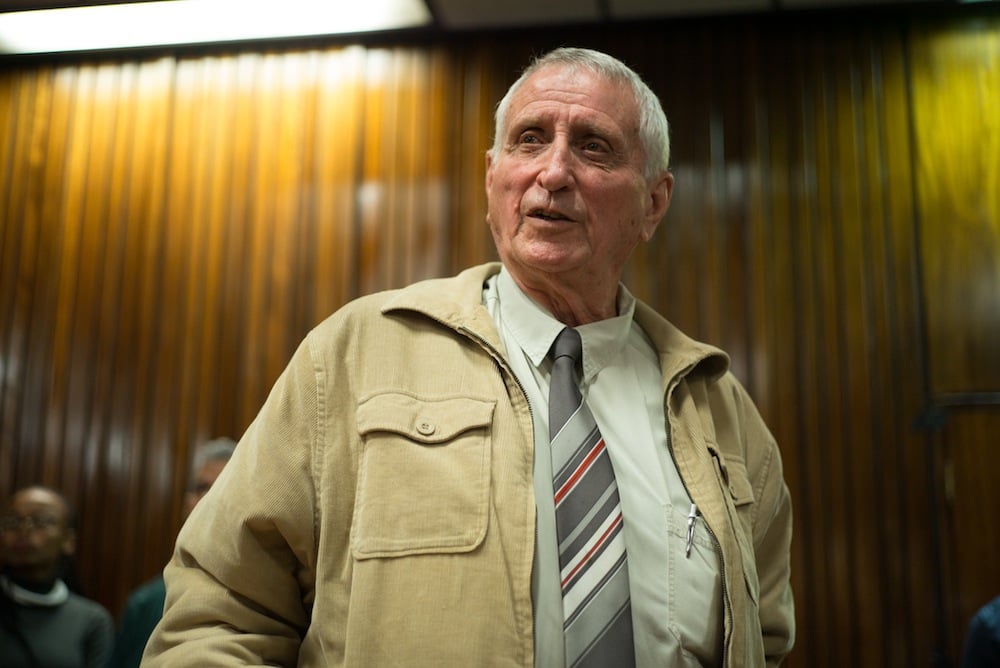Persistent: Under the unrelenting questioning of Judge Billy Mothle
Presiding Judge Billy Mothle had heard the evidence at the Ahmed Timol inquest. Those who were there 46 years ago say Timol stood up, moved swiftly to the window and dived 10 floors to his death. Those giving evidence in the high court this week said his injuries meant Timol was barely conscious before his death and could not have walked to the window.
The last person to see Timol alive was former security police sergeant João Rodrigues (now 78), a 1.9m former rugby player. He told Mothle that he was unable to stop the 1.6m Timol from diving out the window.
Rodrigues was meant to guard Timol after two interrogators, Captain Johannes Gloy and Captain Johannes van Niekerk, left the room.
During his testimony, he dismissed the new evidence presented by independent pathologists detailing the broken, battered state of the anti-apartheid activist’s body before his death as being mere “speculation”.
And then Mothle called for an early lunch. He wanted to question Rodrigues and “once I start, I don’t want to stop”.
In each of the statements of three police officers who appeared before the 1972 inquest into Timol’s death the year before, one line is repeated almost verbatim: “I did not see any assault on this person, nor was this person assaulted in my presence.”
This week, the repeated line fascinated Mothle and Rodrigues eventually caved in under the pressure of his questions. He admitted to the court that when General Stoffel Buys, the officer investigating Timol’s death, instructed him to add that Timol was not assaulted, he acquiesced. But Rodrigues remained adamant that his statement was the truth. “It is the truth, sir; it is the whole truth and the only truth,” Rodrigues said.
Timol, an ANC and South African Communist Party member, allegedly killed himself on October 27 1971 by “diving” from the 10th floor of the then John Vorster Square (now Johannesburg Central police station) after being detained for five days.
Conflicting accounts
The evidence in the inquest doesn’t add up. Last week, independent forensic pathologists Dr Steve Naidoo and Dr Shakeera Holland told the court that, before Timol fell, his skull had been fractured on the left side, he had bruising on his body and his left lower jaw was crushed. His left ankle was dislocated, Naidoo said. Timol’s injuries meant he would have been barely conscious and unable to walk, the pathologists testified after reviewing the state’s postmortem report on Timol’s body from 1971.

Former security police sergeant João Rodrigues
Faced with Rodrigues’s version that an agile and swift Timol “dived” head-first through a window to his death, and the conflicting evidence that Timol had been hurt in a debilitating manner, Mothle presented his predicament to the weary Rodrigues on Wednesday.
“The story you gave to the inquest in 1972, which you have repeated [here], does not accord with the other evidence we have,” Mothle said.
Rodrigues dismissed the testimonies from the pathologists, saying they had not been there to see Timol’s body. “I was there; I was present when this thing happened,” he said.
‘Fabricated evidence’
Advocate Howard Varney, representing the Timol family, accused Rodrigues of “fabricating” evidence. Varney suggested that Van Niekerk, Gloy, Rodrigues and perhaps others in the security branch were with Timol at the time of his death. He charged that Rodrigues was made to testify in 1972 that he was the only witness to the death to shield the senior officers from scrutiny.
Rodrigues conceded that Buys had pressed him to falsify evidence in his statement so it would appear that he (Rodrigues) and Timol had “wrestled” before his death. Although Rodrigues said he refused the instruction, Varney said the fabricated statement would have served to justify Timol’s injuries before the fall.
The advocate alerted the former security cop that if the inquest found he had collaborated with the security branch to manipulate evidence or plan Timol’s murder, then the Timol family lawyers would ask the National Prosecuting Authority to prosecute him for perjury, and for murder or accessory to murder.
“I don’t agree. I’m innocent,” Rodrigues responded.
But under the scrutiny of a persistent judge, Rodrigues stumbled. After three days of questioning, he admitted to Mothle it was possible Timol could have been tortured.
“I cannot say it did happen, but I can say there is a time where it could have happened,” he said.
“I agree,” said Mothle.
‘He can confess’
Until Wednesday afternoon, after Varney announced the Timol family would seek prosecution, Mohammad Timol, Ahmed’s brother, was still hopeful that Rodrigues would disclose everything he knew.
“There’s nothing stopping him from coming back and saying: ‘Listen, I want to confess’,” he said.
Later, Mohammad would turn his face sharply away from Rodrigues and visibly scoff at his response to Varney’s question of whether the apartheid police officer had seen the tearful testimony of Ahmed’s mother, Hawa Timol, at the Truth and Reconciliation Commission.
“I did not hear about it and I didn’t have any information on it,” Rodrigues answered.
Rodrigues often testified he “cannot recall” or “cannot comment” on questions about torture that were posed to him. Mohammad, meanwhile, believes Ahmed was in a coma as a result of the severity of the torture meted out by security police.
The findings in the inquest will depend on whose version Mothle will accept or reject – that of the apartheid cop who is adamant Timol committed suicide or the pathologists who say it is not medically possible.